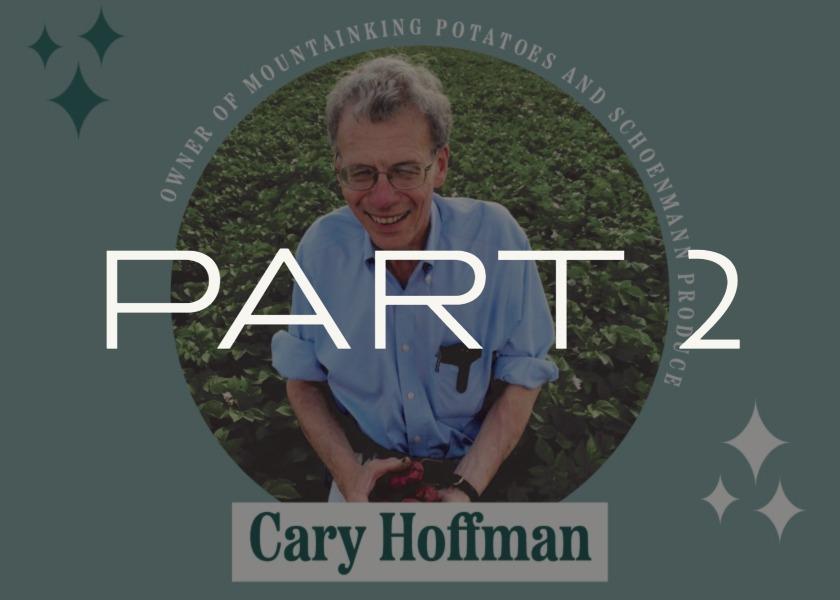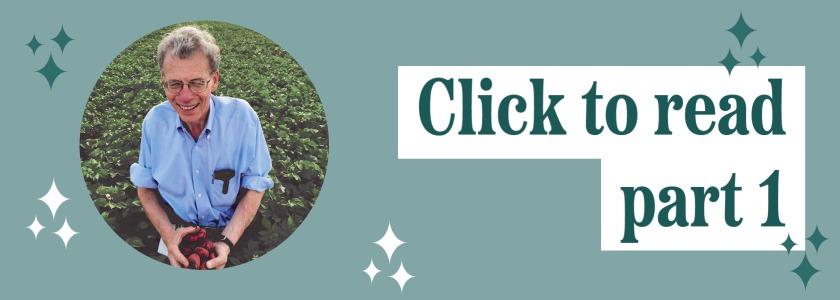Part 2: Cary Hoffman, advocate of new potato varieties

In a fresh produce career that has spanned nearly 50 years, Cary Hoffman still finds passion for the action of fresh produce and the challenge of growing consumer demand for potatoes. For the past 25 years, that journey has included bringing niche potato varieties from Europe to the North American market. Hoffman, owner of MountainKing Potatoes and Schoenmann Produce, both based in Houston, was attracted to the “action” of the produce wholesaling when he first started his career in the early 1970s. He eventually invested in potato production in Colorado and became a fresh shipper, developing an affinity for specialty potato varieties, starting with the yukon gold and expanding to European varieties.

The Packer: I know your travels to Europe in the late 1990s, on your way to adopt a child in Russia, also opened your eyes to other potato varieties. What was the story behind that?
Hoffman: My wife and I wanted to adopt a child in Russia, and we wound up spending a couple days in Europe before we went to Russia. We spent a couple of days in Holland. I had heard about how potatoes were grown in Holland. And we went up to that part of Holland and met with some of the other companies there that are involved in growing fresh potatoes. They took me out to their fields and showed me those potatoes and it was incredible, just the varieties that they grew.
The Packer: So that piqued your interest. Some of those European varieties were sent to Canada, where they were grown for seed. Eventually you were able to source seed from Canada, correct?
Hoffman: The European countries, particularly Holland, already had people in Canada, principally on Prince Edward Island, who they sent over there to help develop some of the varieties grown in Holland. After a couple of years, we started growing some of those varieties (from Canadian seed potatoes).
The Packer: Since those years, ago the U.S. has seen a lot of growth in demand for varietal potatoes, and that has changed the industry. You have been a part of that.
Hoffman: Yes, we have. And as far as I know, we are still the only ones that bring in seed from Holland into Canada and from there into the U.S., as far as gold potatoes are concerned.
The Packer: What do you think about the next couple years in terms of potato variety trends?
Hoffman: To answer your question, if you look at what happened to apples, some years ago, probably 30 years ago, now, there (were) two kinds of apples, there were red delicious apples and there were golden delicious apples. The varieties of apples that have been developed since then (are amazing): you go to the grocery store these days, and there is not a half a dozen different varieties of apples, but a dozen different varieties of apples.
You go into grocery stores in Europe, and there’s multiple varieties of apples, but there’s also, in Europe, multiple different varieties of potatoes.
But when you look at what’s going on here in the U.S., while there are multiple varieties of red potatoes that are grown, gold potatoes that are grown and russet potatoes are grown, what do you see on the bag? You see it’s red potatoes with the store’s name on it, or the shipper’s name on it, or gold potatoes, or russet potatoes. Except for Idaho. (The packaging) does not indicate the variety of potato that are in those bags. And Idaho doesn’t do a very good job of promoting this difference, but at least they’re doing (it) better than anybody else.
The stores aren’t pushing those varieties. The shippers aren’t pushing those varieties.
The potato industry — and I get on my soapbox here, but I’ve said this many times, at many meetings, that we have not done a very good job of promoting potatoes.
And I wish there were some way that we could make that happen, so that we could increase the overall sales of potatoes across the country.
We could increase the sales of reds, of golds, of russets; take an item that can sometimes get to be boring to a variety (identity) that people want to buy more of and more frequently than what’s been happening. I don’t know when we will get there, but it would be very good if somehow the potato industry could learn from the apple industry, that multiple varieties of potatoes could marketed just like multiple varieties of apples have been. It can’t happen overnight; it would certainly be nice if it started to happen.







